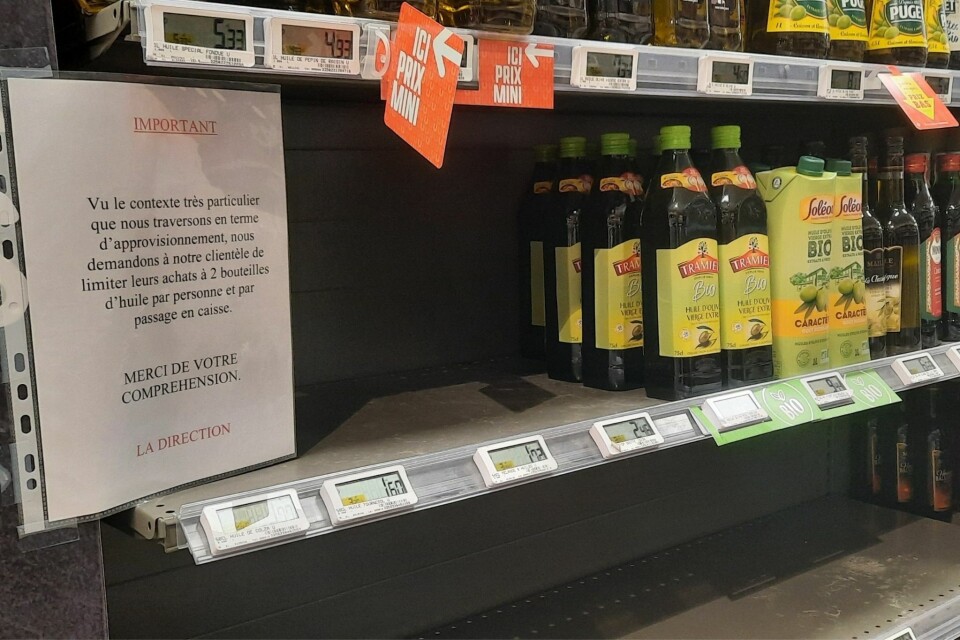-
Britons are the largest foreign community of second-home owners in Nouvelle Aquitaine
See which other departments in the region are popular with British nationals
-
Travellers risk extra costs under new Eurotunnel ticket rule
Some fare options are less flexible and less forgiving of lateness
-
May will be difficult month for train travel in France, warns minister
Two major train unions are threatening to strike and are ‘not willing to negotiate’, he says
Sunflower oil shortage prompts recipe changes to shop foods in France
Labels on everyday products may not reflect the replacement of sunflower oil with other ingredients for up to six months

The ingredients of everyday products such as crisps, biscuits, margarine and sauces sold in France may soon change as a result of a shortage of sunflower oil caused by the war in Ukraine.
The government has authorised manufacturers to replace sunflower oil in their recipes with alternatives such as rapeseed oil, palm oil or soya lecithin, without being required to change the labels on the packaging. The authorisation is set to last for a maximum of six months.
After this, labels must reflect the new oil on the packaging. Manufacturers must highlight a change in recipe after two months, without necessarily detailing which ingredient has changed.
This is because the industry has said that entirely new labels with precise details of ingredient changes can take up to six months to create and roll out.
In contrast, in some cases, labelling changes must be immediate. For example, if there is a change in allergens, or if claims on the packaging are no longer true, such as “100% organic” or “no palm oil”.
All products that have been granted authorisation to change their recipes are listed on the anti-fraud website (the DGCCRF). This authority will be responsible for ensuring that companies adhere to the rules for the six months.
The authorisation comes after weeks of meetings between manufacturing heads and the Economy Ministry.
A government committee is set to meet every two weeks to monitor the implementation of the measures and adapt them if needed.
What products are affected by the change?
The Economy Ministry has warned that hundreds, if not thousands, of products may be affected, including:
- Fried goods such as crisps or fries
- Breadcrumbed items
- Margarine, pastes, and spreads
- Sauces
- Chocolate and biscuit products that use sunflower oil in the form of lecithin
Mathieu Pasquio, from the Coopération agricole, told La Dépêche that in the "majority of cases" the changes in recipes would be minor, and would present "no risk to consumer health", citing the replacement of sunflower oil by rapeseed oil, for example.
Sandrine Blanchemanche, from the agro-industry trade federation ANIA, said that the new rules would be "complicated to implement" but that she was glad to have found a compromise.
Why is there a shortage?
The war in Ukraine has severely affected supplies. Ukraine normally provides 50% of the world’s supply of sunflower oil. However, it has not been able to export it due its ports being blockaded.
How will I know which products have been changed?
It may not be immediately obvious. This has prompted NGO Foodwatch to insist on the “need for total transparency” and has launched a petition to this effect. It has also warned that the new rules would be a “headache” for consumers.
It has called for products with a new recipe to be labelled with stickers to indicate the change, or for shops to display a QR code that would take consumers to the DGCCRF website page so that they can consult the list.
It has also called for manufacturers and distributors of the products concerned to "facilitate access to information on the shelves and directly on the products concerned".
Olivier Andrault, head of food campaigns at consumer group UFC-Que Choisir, said: "The fact that these products are grouped together on a website is not enough, it is not practical for the consumer. This is a major step backward.
“We were arguing for a maximum duration of two months [in contrast to the six months decided].”
Yet, French allergy prevention association l'Association française pour la prévention des allergies (AFPRAL) has welcomed the rules on allergens, saying that it is “essential that consumer safety be preserved”.
Related articles
Price of toilet paper to rise significantly, says boss of E. Leclerc
Ukraine crisis will push up petrol prices in France by 10c a litre
Ukraine war has rocked the balance of our continent, says Macron
Conflict in Ukraine: Petrol prices hit record highs in France
























